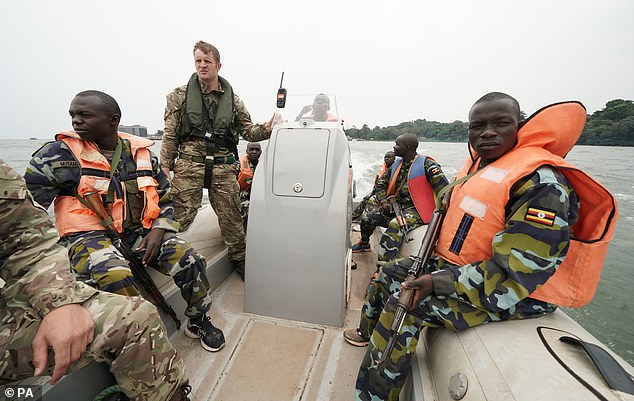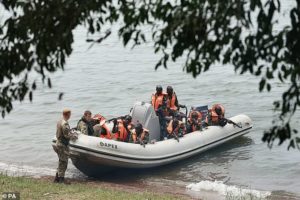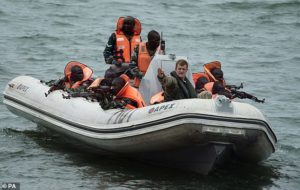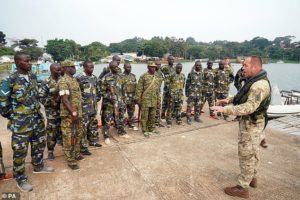British train Ugandan boat squadrons to fight Al-Shabaab in Somalia

British troops have been training their Ugandan counterparts to help them prepare for a difficult peacekeeping deployment where they will fight the al-Qaida linked group al-Shabab.
Uganda is the biggest contributor to the African Union Mission in Somalia (Amisom) – with 5,000 troops forming part of the 20,000-strong force.
The group, created in 2007, has been at the forefront of efforts to tackle the extremists who want to topple the western-backed government.
During their deployment, marines from the Ugandan People’s Defence Force (UPDF), will protect the area and sea around Mogadishu airport in the Somali capital.
For more than a month, eight British Royal Marines under the 1 Assault Group have been working on the water and beaches of Lake Victoria in Entebbe, Uganda, sharing their vital skills.
This has included lessons on how to use boats tactically in the littoral environment – the shore area – conduct patrols, operate vehicle checkpoints as well as stopping and searching suspect craft.
Royal Marines Reservist, Corporal Chris Carmichael from Crosby, Merseyside, said: ‘When they are over there (in Somalia) they will be based on the water and potentially coming on to land as well to do vehicle checkpoints.
‘So from there, we have been able to teach them the skills of how to protect themselves, how to insert properly – tactically into a situation – how to search the vehicles properly, how to detain people if necessary and obviously extract back on to the sea and away if needs be.’
Their training has also involved human security and gender issues, featuring tips on spotting, dealing with and talking to potential victims of trafficking, slavery and other forms of exploitation.
Captain Jacob Katumba of the UPDF Marine said these skills will help them identify potential ‘wrongdoers and innocents’ and how to handle these situations during their 12-month deployment.
‘We have really learnt about those things and we are really confident with them and can apply them on the ground,’ he said.
The al Qaida-linked al-Shabab controls vast swathes of rural areas in southern Somalia and has carried out multiple bombings and guerrilla attacks on targets including shopping centres and hotels across eastern Africa.
Al-Shabab was formed in 2006, emanating from the Islamic Courts Union that ran the Somali capital, for six months before being driven from power.
Captain Isaac Vunya, a UPDF training officer, said al-Shabab often gets intelligence from local fishermen about Amison, will attack when supplies are taken to forward operating bases and that many roads are littered with landmines.

Witnessing an improvement in his troops’ skills, he said it is difficult to fight al-Shabab who use different tactics to their own – including using women and children to carry out suicide attacks.
The short-term training in Uganda is being led and coordinated by the British Peace Support Team (BPST) Africa – a team of 26 military and civilians who are permanently based in Kenya, Ethiopia and Botswana.
Under the latest round of teaching efforts in Uganda, soldiers from the 2nd Battalion Princess of Wales’s Royal Regiment have also spent between two weeks and three months training the UPDF army.
The 17 British personnel who form part of the Army’s Specialised Infantry Group have focused lessons on intelligence and how to defend forward operating bases.

This has been primarily conducted on a vast UPDF owned training area in Singo, two hours north of Entebbe, with local soldiers spending more than a month living and exercising in the field.
Captain Alex Echeru of the UPDF’s task force there said preparing in this way provides a realistic example of what he and his troops can expect in Somalia.
Their training has also covered basic medical techniques, such as carrying stretchers, as well as treating and evacuating injured soldiers under fire.
Lance Corporal Lyndsey Jenks, a combat medical technician from Newcastle, said they quickly discovered that UPDF troops deploy to Somalia without tourniquets – a lifesaving device used when there is life-threatening to bleed from a limb.
The 28-year-old said they have since taught the UPDF to improvise and create one using sticks and bandages to ‘buy time’ before they can get to a field hospital where a tourniquet would be available.
Praising the training he has received from the UK troops, Capt Echeru said they ‘inspire confidence’ among UPDF soldiers.
He added: ‘My humble request is that they keep hanging around and the knowledge is passed to almost everybody in the Army – then I know we shall be better and better.’

SOURCES: DailyMail